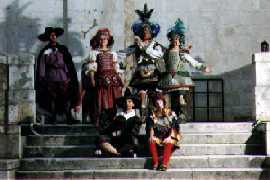
STUDY GROUP: Anthropolology of Music in Mediterranean Cultures
Report on the Bari Conference, 27-30 June 1996
 |
Interdisciplinarity again characterized the meeting of the STG in Bari, Italy on 27-30 June 1996, in conjunction with the conference and festival, "Musicisti del mediterraneo -- Storia e antropologia" ("Musicians in the Mediterranean -- History and Anthropology"), organized by Mousikè. |
In particular, the perspectives and methodologies of history and anthropology were brought to bear on music, musicians, and musical transmission in the Mediterranean and beyond, that is in diasporic cultures whose histories originated in or intersected with the Mediterranean. Participants also examined history and anthropology as two disciplinary frameworks for the study of music, in other words, the fields of historical musicology and ethnomusicology. Mediating these seemingly opposing concepts in the conference's theme was the further component of the theme, the "musicians" as agents not only of music making but also in the construction of history. During the course of the conference, scholars from both sides of the disciplinary boundaries explored ideas and themes beyond their own traditional domains, thereby opening particularly fruitful discussions and charting new territories for future cooperation.
The opening day of the conference focused on the larger themes of the conference itself, history and anthropology. Convened at the University of Bari, the opening session comprised two keynote addresses and several briefer case studies or applications of historical and anthropological methods to the study of music. Giovanni Muto, political historian from the University of Naples, surveyed different historiographical approaches to the Mediterranean in the "historical" keynote. Drawing widely from numerous intellectual traditions and different parts of the Mediterranean, Muto illustrated the importance of the Mediterranean as a source for historiographical theory itself, which is to say, as a prototype for representing history in Western as well as non-Western cultures. Indeed, it is precisely because of its position on the borders between the West and the non-Western that the Mediterranean is so rich in historiographical traditions. Muto concluded by arguing for topoï of continuity, not least among them the political structure of the court and the city throughout the Mediterranean. Philip V. Bohlman (Universities of Vienna and Chicago) presented the "anthropological" keynote in the opening session. By taking myth and music as intersecting themes in the diverse cultures of the Mediterranean, Bohlman argued for an anthropological history of music. Drawing further on the biblical metaphors for diaspora in the book of "Deuteronomy," he proposed that the Mediterranean serve as a theoretical model for ethnomusicological histories of diaspora, for example along Atlantic littoral and in the New World.
The second day of the conference was devoted entirely to anthropological and ethnomusicological approaches. Moved up the Adriatic coast to the medieval Templar's Hall in Molfetta, the conference continued with morning presentations by Amnon Shiloah (Hebrew University of Jerusalem) and Karl Signell (Center for Turkish Music, University of Maryland, Baltimore County). Shiloah focused the search for common themes even more by concentrating on the musician, especially the common roles of music makers in Muslim and Jewish cultures. Reflecting on decades of research in the Eastern Mediterranean, Shiloah illustrated the ways in which ideas about music, rather than music itself, cross the boundaries between the major religions of the Mediterranean. Karl Signell dramatically shifted the Mediterranean themes of the conference to the United States and the ethnic communities formed by Mediterranean immigrants. With a wide range of field recordings, Signell emphasized the importance of individual musicians in transmitting specific genres and traditions, and then in constructing diasporic music cultures.
Papers in the afternoon session expanded upon the themes of individual musicians, immigrant cultures, and diaspora, adding to these themes the anthropological consideration of musical instruments and musicians' biographies. In a paper with a sweeping scope Tullia Magrini (University of Bologna) examined the changing relation between the Cretan musician, Kostas Papadakis, and the instruments, repertories, and contexts in which he played as a representation of emigration, diaspora, and the changing historical forces in the Mediterranean. Nico Staiti (University of Bologna) continued to focus on musical instruments, drawing however on his historical research in musical iconography and his ethnographic research with musicians in Sicily. Diversity and multiculturalism informed the approaches brought by Svanibor Pettan (Institute of Musicology, Zagreb) and Enrique Camara (University of Valladolid) to their presentations. Pettan posed the politically and methodologically relevant question, to what extent can we perceive Mediterranean themes in the musical identity of Croats? Without answering the question unequivocally, Pettan showed that national studies contain many of the fundamental issues that the STG itself is attempting to address. Camara presented a national study of a different sort by drawing upon his field studies of the Spanish diaspora culture in Argentina. Given the centuries-long immigration of Spaniards to Argentina, Camara's paper clearly illustrated the difficulty of separating historical from anthropological approaches.
As the conference returned to Bari for its third day, it also moved to a more specific thematic area, the "Exchange of Musicians and Theatrical Troupes between Italy and the Iberian Peninsula". As a whole the papers challenged prevailing notions that the history of opera should chronicle individual composers, opera houses, and music-dramatic genres. Instead, the history of opera has been the result of mobility and exchange as musicians traveled from country to country. Exchange, moreover, characterized the interaction between genres and across social boundaries, for example between religious and secular practices. Following position papers by Juan-José Carreras (University of Saragozza) and Manuel Carlos de Brito (Free University of Lisbon), a coterie of Spanish scholars underscored the need for new approaches to Iberian music drama, particularly more ethnographically and anthropologically informed approaches.
Afternoon papers transformed the challenges of the morning papers into a clarion call for a new interdisciplinarity. Louise Stein (University of Michigan) and John Griffiths (University of Melbourne) not only introduced their own attempts to ask questions about the different artistic practices that shaped music drama in the Mediterranean, but also demonstrated the ways in which interdisciplinary approaches could potentially reshape the ways in which history itself was constructed. Jean Duron (Center for Baroque Music, Versailles) and Michele Rak (University of Arezzo) also pushed at disciplinary boundaries by interpellating the boundaries slapped on music drama by the early-music movement, boundaries that neutralized the processes of change and difference that characterized these musics at the time of their composition. During the course of the historical papers on the third day, it became increasingly evident that the processes of exchange brought about by musicians in the Mediterranean bore resemblance to the processes of diaspora that the anthropological papers had so forcefully raised on the previous day.
On the final day of the conference, with its theme of "Ceremonial Musicians and Musical Chapels in the Mediterranean of the Modern Era," a group of distinguished music historians provocatively proposed ethnographic themes and methods that stood to transform their discipline. Claudio Annibaldi (Conservatory of Rome) opened with a position paper, in which he detailed the anthropological approaches in his own research. Giulio Cattin (University of Padua) and Iain Fenlon (King's College, Cambridge University), both active participants in the STG, moved from the theoretical to the more concrete topics of their own research as well as of colleagues in their respective fields, demonstrating that ceremony and ritual were not isolated events in history, but rather ongoing processes that respond to cultural change. Neither Cattin nor Fenlon shied from hard questions about the truly anthropological character of the research methods themselves. Is historical research just like anthropological research? Or can it adopt methods that change the ways in which the historian enters the field? The closing papers by David Bryant (Cini Foundation, Venice), Elena Quaranta (Center for Music Paleography, Cremona), Paolo Emilio Carapezza (University of Palermo), Dinko Fabris (Conservatory of Bari), and Jean Lionnet (Center for Baroque Music, Versailles) offered additional case studies from diverse areas of historical musicology to bolster the call for increasing the historian's awareness to the processes studied by the anthropologist and the ethnomusicologist.
Musical performances enriched the conference and further provided points of discussion related to history and historicism, as well as the representation of the past in the present. Medieval music, particularly repertories associated with women, provided the basis for the performance by La Reverdie on the second evening. The first modern performance of Francesco Provenzale's Stellidaura (1674), in a spectacular edition by conference organizer, Dinko Fabris, provided the high point of the third day, which had been devoted to music drama in the Mediterranean.


Scene from Francesco Provenzale's Stellidaura
Although the conference brought together an incredibly diverse and international group of scholars, a number of common themes emerged. Primary among these was diaspora, whether as a process of historical movement and dispersion as a response to political crisis or as the exchange of musicians and the flow of musical genres and styles. In contrast, centers and stages constituted another common theme, for example, in Giovanni Muto's emphasis on the cultural role of courts and in the Iberian scholars' attention to opera and music drama. Narrative -- in very different forms -- provided a further topos shared by historians and anthropologists: narrative in myth, narrative in theatrical traditions, and narrative in popular music and the construction of identity. It was quite striking that the constructs of history proliferated during the course of discussions, in a sense becoming "histories" that take place at various levels and derive from complex processes and media of transmission. This plural presence was already evident in the reference to "musicians" in the conference name, that is musicians as individuals and agents, rather than simply as actors who play out the larger forces of music history. Finally, the papers and presentations during the conference underscored the importance of the Mediterranean as a phenomenon of world history and international music traditions. The Mediterranean was -- and is -- a center for the interation of world religions, a source for settlement in North and South America (and elsewhere, e.g., in Australia), and an ethnomusicological landscape lending a special historical tension to diaspora. Confronting these common themes, the conference participants discerned points of tension and uncertainty, but took up the challenge to chart new areas for future collaboration and conferences.
The meeting of the STG and the conference benefited from considerable generosity and support. As always, the STG enjoyed its special collaborative relation with the Olga and Ugo Levi Foundation of Venice and the creative engagement of its chair, Tullia Magrini. Further financial support from the European Union, from numerous Italian universities, and from local and regional cultural organizations in Bari and the province of Puglia assured that the conference was exemplary in every way. Special thanks from the STG are due not only to these many organizations, but also to Dinko Fabris and his colleagues in Bari, whose tireless efforts made the conference possible. It is planned that the discussions and exchanges that began at the conference will find their way into print, disseminating for anthropologists and historians of music the debates about the interaction of their fields in the Mediterranean and in the histories and diasporas that owe their origins to the Mediterranean.
Philip V. Bohlman